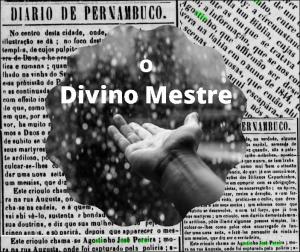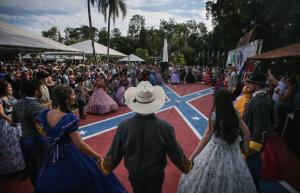In my last post, I argued that the histories of the U.S. Black Church and Brazilian Protestantism have points of contact that could be fruitful for constructing a hemispheric Afro-descendant Christianity. I said that these points of contact could be revealed in at least two ways: 1-via stories of Black religiously informed resistance in Latin America that resemble moments in the histories of the U.S. Black Church and, perhaps paradoxically, 2-by revealing overlaps between the religiously informed White supremacies that also connect religious communities across the hemisphere.
One example of the first possibility is that of Brazilian protestant preacher Agostinho José Pereira, nicknamed the “Black Luther” in the 1840s. Although histories of Brazilian Protestantism have tended to name the church founded in 1858 by Congregationalist missionaries Robert and Sarah Kaley as the first Protestant church in Brazil, the church Pereira founded in 1841—called the Church of the Divine Master—confronted the Portuguese empire and its White Roman Catholic establishment.[1] Pereira attracted hundreds of poor people, free Black men and women, and even native Brazilians. When he was arrested together with other members of the church in 1846, he was accused of being a schismatic for starting a Protestant church and forming a community that had the objective of organizing a slave rebellion. The province police found a Bible in the house of one of Pereira’s church members that had anti-slavery passages underlined, as well as a text praising the Haitian rebellion. Pereira was eventually released, as were the members of the Church of the Divine Master that had been arrested. Not much is known about what happened to them after they were freed. Still, stories such as this reveal overlap between Black Christianity in slaveholding Brazil and the United States that can be further explored to foster a stronger sense of solidarity between the US Black Church and Afro-descendant Christians in Latin America.

Regarding the overlaps between religiously-informed White supremacies that affect the US Black Church and Latin American Christians, I will mention one example that may seem counterintuitive. Still, this example provides another thread in the tapestry of historical connections that could continue to be traced: Southern Baptist missions in Brazil. From its beginning in a colony of Confederate exiles who were attracted to Brazil after the US Civil War partially because Brazil remained a slaveholding country, to the dissemination of White Christian nationalism via periodicals and sermons, to the missionary praise of “Confederate heroes” like Robert E. Lee and Stonewall Jackson up to the second half of the 20th century in both English and Portuguese, to the missionary support of the military coup in the 1960s and the dictatorship that lasted until 1985, to the enthusiastic praise of Jair Bolsonaro by the leaders of the Brazilian Baptist Convention—whose leadership still follows the general dispositions of the SBC—one can see the impact of missionaries from the Southern US in Brazilian life.[2] This impact was informed by things the US Black Church has consistently confronted but many times remained largely unnoticed by Brazilian Protestants: missionary commitment to Lost Cause Mythology, segregationist anxieties, and a theopolitical imagination that aligned itself firmly with Southern-flavored fundamentalism and US evangelicalism.[3]

The very myth of racial democracy that helped shape Brazilian identity and that informed the tendency of many Brazilians to de-emphasize their African heritage was facilitated by Southern missionaries who helped Gilberto Freyre—who would become one of the most influential intellectuals in Brazilian history—to study at Baylor University in Waco, Texas.[4] The violence Freyre witnessed in the South, and the connection he noticed between Southern violence and the White Southern religion of the missionaries he once appreciated were the main reasons why Freyre left Baptist life and why he started the process of imagining Brazil as a place with a strong potential for racial harmony via miscegenation. Partially by comparing racial relations in Brazil to the Jim Crow South he experienced among Baptists in Waco, Freyre argued that national, racial divisions in Brazil had been largely overcome by the miscegenation of African Slaves, Portuguese colonizers, and the indigenous population. Freyre’s racial democracy myth, as well as other understandings of mestizaje present throughout Latin American and Latinx communities, often provide avenues for the ideological dilution of the African heritage while providing little remedy for the hard fact that that the social structures and meanings of White supremacy offer little respect for these ideological convictions.[5] I will say more about Freyre’s influence in the concluding part of this three-part reflection next month.
[1] For a brief account of Pereira’s story see Ronilso Pacheco, Teologia Negra: O Sopro Antirracista do Espírito (Brasília: Novos Diálogos; São Paulo: Editora Recriar, 2019).
[2] My book The Global Mission of the Jim Crow South: Southern Baptist Missionaries and the Shaping of Latin American Evangelicalism (Macon: Mercer University Press, 2022) traces the saga of Southern Baptist racism in Brazilian history in general and in the history of Brazilian Protestantism in particular.
[3] Many publications in the field of US religious history recognize these characteristics as marks of US White evangelicalism. For examples see Anthea Butler, White Evangelical Racism: The Politics of Morality in America (Chapel Hill: University of North Carolina Press, 2021); Robert P. Jones, White Too Long: The Legacy of White Supremacy in American Christianity (New York: Simon & Schuster, 2020); Kristin Kobes Du Mez, Jesus and John Wayne: How White Evangelicals Corrupted a Faith and Fractured a Nation (New York: Liveright Publishing, 2020); Matthew Avery Sutton, American Apocalypse: A History of Modern Evangelicalism (Cambridge: Belknap Press, 2014); Charles Reagan Wilson, Baptized in Blood: The Religion of the Lost Cause, 1865-1920 (Athens: University of Georgia Press, 2009); and Paul Harvey, Redeeming the South: Religious Cultures and Racial Identities Among Southern Baptists, 1865-1925 (Chapel Hill: University of North Carolina Press, 1997).
[4] Originally published in 1933, Freyre’s The Masters and the Slaves was one of the strongest factors in the intellectual dissemination of the idea of Brazil as a racial democracy. For a version in English see Gilberto Freyre, The Masters and the Slaves (Casa-Grande & Senzala): A Study in the Development of Brazilian Civilization (Berkeley: University of California Press, 1987). For good overviews of the legal and political discouragement of using racial categories to diagnose social problems in Brazil, see Graziella Moraes Silva and Marcelo Paixão, “Mixed and Unequal: New Perspectives on Brazilian Ethnoracial Relations,” in Pigmentocracies: Ethnicity, Race, and Color in Latin America, ed. Edward Telles (Chapel Hill: University of North Carolina Press, 2014) and Micol Seigel, Uneven Encounters: Making Race and Nation in Brazil and the United States (Durham, N.C.: Duke University Press, 2009).
[5] For a treatment written to public audiences that touches on the relationship between Freyre’s legacy and Baylor University see Joao Chaves, “Schools’ Lessons on Racism Often Knows No Global Boundaries,” Good Faith Media (blog), https://goodfaithmedia.org/schools-lessons-on-racism-often-knows-no-global-boundaries/.













